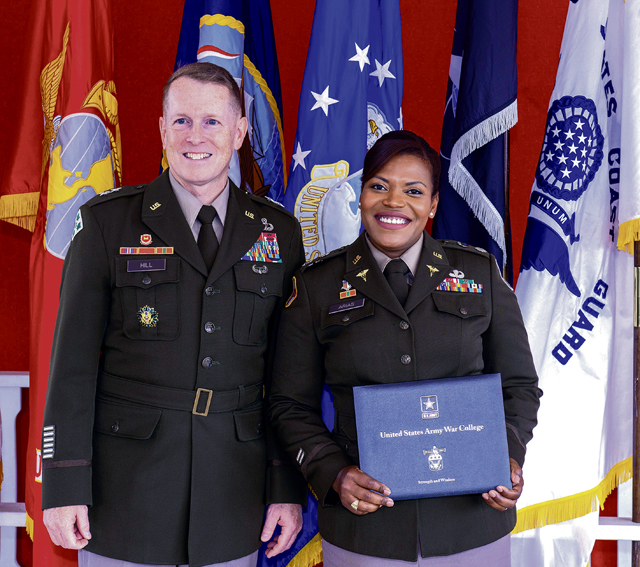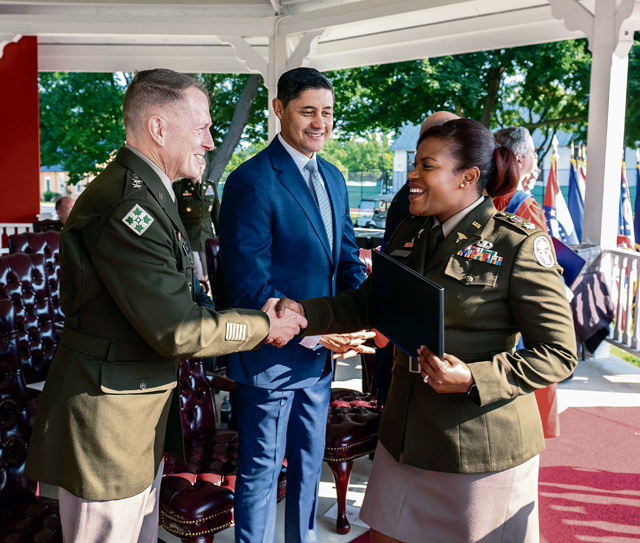
The United States Military Academy’s William Simon Center for Professional Military Ethics Award was recently bestowed upon U.S. Army Lt. Col. Marlene Arias-Reynoso, an Army psychiatric nurse practitioner who currently commands the U.S. Army Health Clinic in Ansbach.
The Professional Military Ethics Award was presented to Arias-Reynoso for a Ted-Talk style video she produced while attending the U.S. Army War College. The video titled, “Getting Left of the Boom,” focuses on transforming suicide prevention in the military by leveraging leadership, especially at the squad and platoon level.
According to the William Simon Center for Professional Military Ethics officials, the ethics award is presented to students for their excellence in research, strategic thought, and communication on national security issues.

“During my time at the Army War College, my primary objective was to share my insights as a behavioral health provider,” said Arias-Reynoso. “I also wanted to bring attention to a topic I am deeply passionate about. I am dedicated to leveraging every platform to enhance behavioral health readiness and ensure that leaders are fully engaged in supporting their teams.”
According to a recent report released by the Department of Defense, suicide is one of the leading causes of death in the U.S. military. The report also indicates rising suicide rates among service members and veterans over the past decade have raised public and professional concerns.
“As a healthcare provider, I came to the realization that the best thing I can do to save lives is engage with leaders,” added Arias-Reynoso. “Ensuring the health and welfare of their Soldiers is a priority for all Army leaders, however, it is leaders at the squad and platoon level who interact with their Soldiers every day.”
According to senior Department of Defense officials, suicide prevention is a long-term effort and the men and women who step up to serve the country in uniform are DOD’s most important asset.
“Junior leaders are the linchpin of Soldier well-being,” added Arias-Reynoso. “To effectively prevent suicides, they must prioritize open and honest communication, fostering a climate of trust where Soldiers feel comfortable seeking help. Recognizing the signs of distress, such as changes in behavior, performance, or mood, is crucial.”
Senior U.S. military officials indicate that behavioral health impacts both Soldier and unit readiness.
“Strong mental and emotional health is essential for Soldiers to perform their duties effectively,” said Arias-Reynoso. “Resilient soldiers make better decisions, adapt more quickly to challenges, and contribute more fully to their units. On the other hand, untreated mental health issues can negatively impact morale, judgment, and overall performance. These issues can also increase the risk of accidents, injuries, and even suicide, undermining unit cohesion and combat readiness.”
What can Army leaders do to ensure the behavioral health and resiliency of their Soldiers?
“Empowering everyone to be a part of the solution is essential,” Arias-Reynoso added. “You don’t have to be a mental health professional to make a difference. Suicide prevention is a collective effort requiring the involvement of Soldiers, leaders, families, and support staff. By investing in prevention programs and fostering a culture of open communication, we can not only save lives but also cultivate a more resilient and effective military force.”


